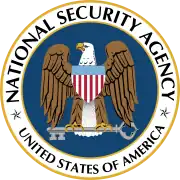Georgia Cryptologic Center
The Georgia Cryptologic Center (GCC) or NSA Georgia is a U.S. National Security Agency (NSA) and Central Security Service (CSS) facility located within Fort Gordon, located outside of Augusta, Georgia. The 604,000 sq ft (56,100 m2) facility opened on March 5, 2012, at a cost of $286 million.[2][3][4] The GCC's facilities has capacity to employ up to 4,000 personnel.[4] Its primary focus is on signals intelligence intercepts from Europe, the Middle East, and North Africa.[4] The facility is known by the codename "Sweet Tea".[4][5]
| Georgia Cryptologic Center | |
|---|---|
| NSA Georgia | |
| Active | 2012 – Present |
| Country | United States |
| Role | Signals intelligence cyberspace operations, and cybersecurity operations |
| Size | 604,000 sq ft (56,100 m2) |
| Part of | National Security Agency |
| Garrison/HQ | Fort Gordon |
| Nickname(s) | Sweet Tea[1] |
Operations
According to the NSA, the Georgia Cryptologic Center "specializes in working closely with military customers to understand their operations, their requirements and their culture to ensure that signals intelligence is tailored and responsive to the needs of the warfighter."[6] The Georgia Cryptologic Center is staffed by both civilian contractors and by military personnel from the United States Army Intelligence and Security Command's 706th Military Intelligence Group, also stationed at Fort Gordon, who specialize in signals intelligence.[7] When the facility opened, the proposed ratio of military to civilian personnel was approximately 3:1.[5] As of 2020, Fort Gordon is also the headquarters of United States Army Cyber Command (ARCYBER),[8] which works closely alongside NSA Georgia.[9][10]
The facilities's personnel include Tailored Access Operations (TAO) units[11] and Farsi-language translators.[12]
History
Before opening the facility at Fort Gordon, the NSA/CSS had a smaller Regional Security Operations Center located at Fort Gordon.[13] Named the Gordon Regional Security Operations Center, it was established in 1994 and operated under this name until it was renamed to NSA/CSS Georgia in June 2005.[7]
Construction on the Georgia Cryptologic Center facility began in March 2007,[14] During construction the facility was not referred to as an NSA facility in any documentation and was referred to as "Sweet Tea".[5] The facility opened in 2012. Press were invited to the opening ceremony, though cameras were not allowed at or near the facility.[1]
The facility made international headlines[1] in 2017 when Reality Winner, a civilian contractor employed at the Georgia Cryptologic Center, was arrested after sending a top-secret report about Russian interference in the 2016 United States elections to the news organization The Intercept.[15][16]
See also
References
- Peebles, Jennifer (June 6, 2017). "The NSA in Augusta? Reality Winner's arrest shines spotlight on agency's Georgia presence". The Atlanta Journal-Constitution. Archived from the original on July 26, 2021. Retrieved December 9, 2022.
- "NSA/CSS opens newest facility in Georgia". Government Security News. March 6, 2012. Archived from the original on December 11, 2015. Retrieved October 17, 2015.
- "NSA Opens 604,000 Sq. ft. Cryptologic Center In Georgia". SecurityWeek. March 8, 2012. Archived from the original on March 4, 2016. Retrieved October 17, 2015.
- Bamford, James (March 15, 2012). "The NSA is Building the Country's Biggest Spy Center (Watch What You Say)". Wired. Archived from the original on March 19, 2018. Retrieved October 17, 2015.
- Rausch, Tim (October 21, 2007). "NSA center expected to boost local economy". The Augusta Chronicle. Archived from the original on March 3, 2009. Retrieved December 31, 2022.
- "NSA/CSS Locations". National Security Agency. Archived from the original on December 22, 2022. Retrieved December 31, 2022.
 This article incorporates public domain material from websites or documents of the United States Government.
This article incorporates public domain material from websites or documents of the United States Government. - "706th Military Intelligence Group". United States Army Intelligence and Security Command. Archived from the original on April 1, 2022. Retrieved December 31, 2022.
- Bynum, Russ (September 3, 2020). "Army Cyber Command completes its move to Georgia base". Washington Post. Retrieved December 31, 2022.
- Jardin, Xeni (September 3, 2020). "U.S. Army Cyber Command completes move to Georgia base". Boing Boing. Archived from the original on September 4, 2020. Retrieved December 31, 2022.
- Roche, Bill (September 3, 2020). "Headquarters dedication heralds arrival of Army Cyber operations at Fort Gordon". United States Army. Archived from the original on August 1, 2021. Retrieved December 31, 2022.
- Aid, Matthew M. (June 11, 2013). "Inside the NSA's Ultra-Secret Hacking Group". Atlantic Council. Archived from the original on October 21, 2020. Retrieved December 31, 2022.
- Yannakogeorgos, Panayotis A.; Geis, John P.; Hagel, Stephen; Dacus, Chad; Conway, John L.; Lowther, Adam B.; Drinnon, Steven (2016). "Force Development". The Human Side of Cyber Conflict: Organizing, Training, and Equipping the Air Force Cyber Workforce (Report). p. 118. Archived from the original on December 31, 2022. Retrieved December 31, 2022 – via JSTOR.
- "NSA/CSS Opens Its Newest Facility In Georgia". National Security Agency (Press release). March 5, 2012. Archived from the original on September 20, 2022. Retrieved December 9, 2022.
- "NSA/CSS Georgia Groundbreaking Advances National Security". National Security Agency (Press release). March 26, 2007. Archived from the original on September 20, 2022. Retrieved December 9, 2022.
{{cite press release}}: CS1 maint: bot: original URL status unknown (link) - Redmon, Jeremy (June 5, 2017). "Augusta contractor charged with mishandling top-secret U.S. materials". The Atlanta Journal-Constitution. Archived from the original on March 2, 2022. Retrieved December 31, 2022.
- Stuart, Tessa (November 24, 2021). "'Bitter,' 'Angry,' 'Enraged': Reality Winner Blasts the Intercept After 4 Years in Jail". Rolling Stone. Archived from the original on December 16, 2022. Retrieved December 31, 2022.
